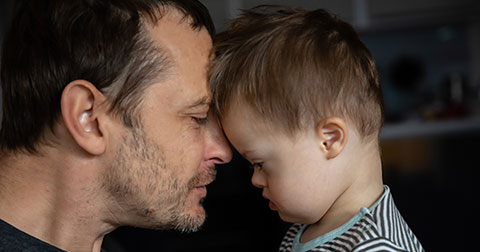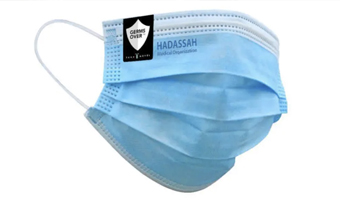
How does living in the midst of COVID-19 affect children and their parents? What about families with children who have special needs?
In a May 27 webinar, organized by Hadassah United Kingdom, Prof. Eitan Kerem, head of the Division of Pediatrics at the Hadassah Medical Organization, offered advice to listeners from 16 countries about how parents can steer their children through the COVID-19 crisis.
Prof. Kerem explained that children, even those with underlying conditions such as asthma and cystic fibrosis, fall ill from COVID-19 much less often than adults. However, the lockdown imposed all over the world has made children “victims” of the crisis.
“Parents need to realize that they, themselves, are under stress, worrying about their children, their own parents, their jobs, and their futures,” Prof. Kerem said. And all children sense that tension.
“Parents need to send the message that ‘we can cope with this new COVID-19 situation, and it will not last forever,’ ” Prof. Kerem emphasized.
All children miss their routines and their friends, Prof. Kerem noted. Therefore, he advised, parents need to create structure and daily agendas for their children. This is particularly important for children with special needs, who are especially susceptible to losing their sense of time and becoming disoriented. In addition, children with special needs may become hyperactive. “Parents need to be strict about maintaining a daily routine, limiting screen time, and enforcing regular sleep patterns,” he said.
Hyperactive children, Prof. Kerem cautioned, may become destructive and start fights with their siblings, and even become violent. To prevent this, he recommended making sure these children get more exercise. “Arrange sports activities at home,” he said, and “don’t leave them unsupervised.”
Desensitizing children to the wearing of masks is also important, especially for those with special needs, Prof. Kerem said. He advised that to dispel fear, parents use masks in play and color them with fun pictures.
Overlaying the other challenges of the COVID-19 pandemic, Prof. Kerem noted, parents of children with special needs worry about whether they will be able to get the necessary medical care and equipment for them. They fear taking them to the hospital for regular treatments, and this hesitation has caused some children to suffer. For that reason he urges parents not to neglect necessary hospital visits. At the same time, he encourages them to take advantage of telemedicine consultations with their child’s physician or therapists to discuss strategies and problems. These can benefit both the parents and their children.
Prof. Kerem also recommends that parents of his patients join support groups. ”It’s important not to feel alone,” he said, “and parents can learn about creative ways to occupy their children and ensure they continue to develop.”
Now that schools have opened in Israel, how safe is it for children with special needs to return to school? Prof. Kerem advised parents to find out how well their child’s school is maintaining social distancing and practicing other safety measures. He suggested that they wait two weeks before sending their child to school to see if COVID-19 cases increased in the country. If they did not see a significant spike in the number of cases, then they should send the children to school. He reassured listeners, however, that if a case of COVID-19 is identified in an Israeli school, that school is immediately closed.
In terms of socializing, Prof. Kerem said that social distancing is very important. Some families, he said, have formed play groups among themselves where they agree to see only one another and gather in each other’s homes so the children can socialize. On a rotating basis, one parent supervises the children so that all the other parents can work, providing a solution to the conundrum working parents face with their children out of school.
Another safety precaution Porf. Kerem recommended is that once the school day is over, as soon as children enter their home, they “wash their hands, take a shower, put on clean clothes, and begin ‘home time.’ ”









